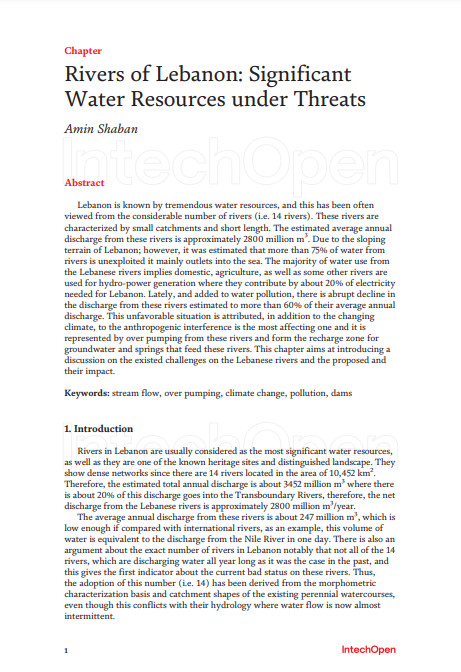Rivers of Lebanon: Significant Water Resources under Threats
 |
dossier Jan 2020 ; 15 páginas
Aut. Amine Shaaban
Ed. CNRSL - Beirut
Formato descargable: PdF
Abstract:
Lebanon is known by tremendous water resources, and this has been often viewed from the considerable number of rivers (i.e. 14 rivers). Due to the sloping terrain of Lebanon; however, it was estimated that more than 75% of water from rivers is unexploited it mainly outlets into the sea. This chapter aims at introducing a discussion on the existed challenges on the Lebanese rivers and the proposed and their impact.
---
Lebanon is known by tremendous water resources, and this has been often viewed from the considerable number of rivers (i.e. 14 rivers). These rivers are characterized by small catchments and short length. The estimated average annual discharge from these rivers is approximately 2800 million m3 . Due to the sloping terrain of Lebanon; however, it was estimated that more than 75% of water from rivers is unexploited it mainly outlets into the sea. The majority of water use from the Lebanese rivers implies domestic, agriculture, as well as some other rivers are used for hydro-power generation where they contribute by about 20% of electricity needed for Lebanon. Lately, and added to water pollution, there is abrupt decline in the discharge from these rivers estimated to more than 60% of their average annual discharge. This unfavorable situation is attributed, in addition to the changing climate, to the anthropogenic interference is the most affecting one and it is represented by over pumping from these rivers and form the recharge zone for groundwater and springs that feed these rivers.
Destino Audiencia:
Palabras claves: |
administración de recursos hídricos (CI) (DT) (HP) (ope) , conflicto (CI) (DT) (HP) (ope) |
País: |
Editor/Difusor: |
|
CNRSL
-
Conseil national de la recherche scientifique du Liban - Beirut - Líbano |
Si hay un enlace roto, estaremos encantados de recibir un mensaje: communication@pseau.org